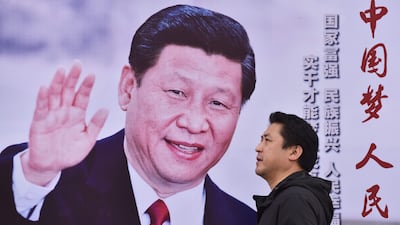That Chinese leader Xi Jinping was recently named "the world's most powerful man" in an Economist cover story is both a marker of China's clout in the world and an indicator of where its ambitions lie. But as the next twice-in-a-decade meeting of the country's Communist Party begins on Wednesday, the question at the forefront of many observers' minds is whether Mr Xi is looking to hold on to power beyond his single 10-year term, or if he is beginning to plan for a future for China without him at the helm.
When Mr Xi took over from Hu Jintao as China's most senior leader in 2012, it was unclear which direction he would take, both politically and in terms of leadership style.
"We didn't know if Xi was going to be a reformer or conservative", said Helen Gao, a Beijing native and governance and law analyst at China Policy, a Beijing-based research and advisory company.
"But it's become clear that Xi is a conservative who wants to guarantee party rule".
Since taking the top post, Mr Xi has purged his party of enemies and political rivals such as the charismatic Bo Xilai, once party chief of Chongqing province, and Ling Jihua, a former senior aide to Mr Hu. The powerful military faction was also shown who was boss, with Mr Xi sacking many high-ranking generals.
Through his centralisation of power, experts say Mr Xi wants to ensure the continued dominance and legitimacy of both the Communist Party and himself as the man in charge.
_______________
Read more:
China to strengthen UAE, Saudi Arabia ties for Belt and Road initiative
_______________
"What makes this Party Congress significant is that Xi Jinping has shaken up expectations about how Chinese leaders in the post-Tiananmen era are supposed to behave and handle things," says Jeffrey Wasserstrom, a professor and historian of modern China at the University of California, Irvine."
Mr Wasserstrom points to Mr Hu and another of Mr Xi's predecessors, Jiang Zemin, who by the midway points of their own 10-year terms had already made it clear who would succeed them. Mr Xi, however, has not yet designated an heir apparent. Meanwhile, ahead of the 19th party congress he has placed himself at the centre of plans for what the government has termed China's "national rejuvenation", the details of which Mr Xi is expected to set out at the week-long meeting. Mr Wasserstrom says he will be following the congress closely to see if Mr Xi gives any "indications of staying on beyond ten years".
Mr Xi's tight grip on power has drawn comparisons to Russian president Vladimir Putin. Like Mr Putin, Mr Xi works hard on cultivating public approval, with a propaganda campaign that includes a heady dose of nationalism and slogans such as "The China Dream". The upcoming congress is meanwhile expected to focus on "poverty alleviation", something that will bolster Mr Xi's already good standing among China's more rural population - always an important grass roots ally for the country's communist leaders. Alongside this is Mr Xi's long-stated aim of building a "moderately prosperous society" by 2020, a goal that includes raising household incomes and reducing income inequality.
The other big question is what will happen to the man considered China's second most powerful, Wang Qishan. Mr Wang — who met with former Trump adviser Steve Bannon in September — is a member of the seven-man Politburo Standing Committee, which consists of China's top leadership, and has publicly led Mr Xi's anti-corruption campaign since 2013. Mr Wang is 69, a year older than the age when Politburo Standing Committee members are expected to retire. But it is rumoured Mr Xi might replace prime minister Li Keqiang with Mr Wang. Such a move would break with the tradition of prime ministers serving two terms and demonstrate Mr Xi's dominance in the Communist Party.
Also in the spotlight ahead of the party congress is Chen Min'er, who currently holds the most senior political position in Chongqing province. Mr Chen has risen rapidly through the party ranks and observers are waiting to see if Mr Xi will promote him to the Politburo Standing Committee. If Mr Xi does promote Mr Chen but not any other party members from the so-called "sixth generation" — those born in the 1960s — then that would suggest Mr Xi is grooming Mr Chen to be his successor. A promotion to the Politburo Standing Committee would mark a meteoric rise for Mr Chen but his political credentials in governing Chongqing, and previously Guizhou province, suggest even greater power is in the Xi protégé's future.
Looking beyond internal politics, Ms Gao believes China under Mr Xi is not yet willing to take on the United States for the position of the biggest global power and the world's policeman. "China will play a bigger role in things like climate change, but it doesn't have the same ambition as the US does, and won't provide the security the US does," she says, adding that the 19th congress will focus more on strengthening China domestically.
But although Beijing may not yet want to replace the US on the global stage, grand projects such as "One Belt, One World" have seen China pour billions into investments and infrastructure projects abroad and suggest it certainly wants to establish a significant sphere of influence.
With so many important questions looming, there is much for international observers to digest as the 19th congress gets underway — not least because it will be followed shortly after with a three-day visit by US president Donald Trump who arrives in China on November 8 as part of his first Asia tour.

